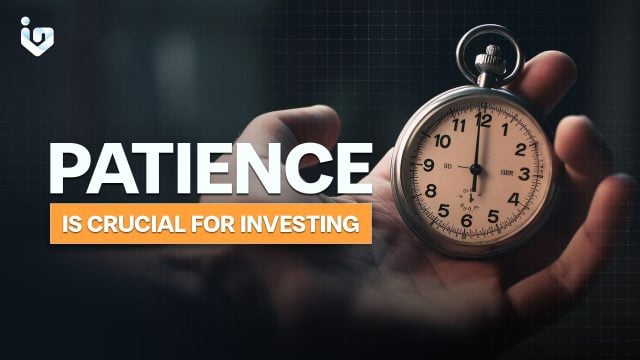Investing is the process of putting your money to work for you, with the expectation of earning a return over time. Investing can help you achieve your financial goals, such as saving for retirement, buying a house, or funding your education. Investing can also help you grow your wealth, beat inflation, and create passive income.
However, investing is not a get-rich-quick scheme, nor a gamble. Investing requires patience, discipline, and a long-term perspective. Patience is crucial for investing, as it can help you overcome the challenges and uncertainties of the market, and reap the rewards of compounding and diversification. In this article, we will discuss some of the reasons why it is crucial for investing, and how to cultivate it.
Patience helps you ignore the noise
The market is full of noise, such as news, opinions, rumors, emotions, and events, that can influence your investing decisions. However, most of the noise is irrelevant, misleading, or short-term, and does not reflect the true value or potential of your investments. Patience helps you ignore the noise, and focus on the signal, such as the fundamentals, trends, and quality of your investments. It helps you avoid making impulsive, emotional, or irrational decisions, such as buying high, selling low, chasing fads, or following the crowd. Patience helps you stick to your investing plan, and act based on facts, logic, and analysis.
Patience helps you benefit from compounding interest
Compounding is the process of earning interest on your interest, or returns on your returns, over time. Compounding is one of the most powerful forces in investing, as it can exponentially increase your wealth, especially in the long run. However, compounding requires patience, as it takes time to accumulate and grow. Patience helps you reinvest your earnings, and let them compound over time. Patience helps you avoid withdrawing your money prematurely, or switching your investments frequently, which can reduce your compounding effect. Patience helps you harness the power of compounding, and achieve higher returns with lower risk.
Patience helps you diversify your portfolio
Diversification is the process of spreading your money across different types of investments, such as stocks, bonds, commodities, real estate, or cash, that have different characteristics, risks, and returns. Diversification is one of the most effective ways to reduce your portfolio risk, as it can protect you from the volatility and unpredictability of the market. However, diversification requires patience, as it means accepting lower returns in some periods, or holding some investments that may underperform or lose value. Patience helps you diversify your portfolio, and balance your risk and return. Patience helps you avoid putting all your eggs in one basket, or chasing the best-performing investments, which can expose you to more risk. Patience helps you optimize your portfolio performance, and achieve more consistent and stable returns.
How to Cultivate Patience for Investing
- Set realistic and long-term goals: Patience for investing starts with setting realistic and long-term goals, such as saving for retirement, buying a house, or funding your education. You should have a clear and specific vision of what you want to achieve, why you want to achieve it, and how you plan to achieve it. You should also have a realistic and reasonable expectation of the returns and risks of your investments, and how long it will take to reach your goals. Setting realistic and long-term goals can help you stay motivated and committed, and avoid disappointment and frustration.
- Do your research and due diligence: Patience for investing also requires doing your research and due diligence, such as studying the market, analyzing the investments, and evaluating the opportunities. You should have a sound and rational basis for your investing decisions, and not rely on hearsay, hype, or speculation. You should also have a thorough and objective understanding of the strengths, weaknesses, opportunities, and threats of your investments, and how they fit your goals, risk tolerance, and time horizon. Doing your research and due diligence can help you build your confidence and conviction, and avoid doubt and fear.
- Review and monitor your progress: Patience for investing also involves reviewing and monitoring your progress, such as tracking your portfolio performance, measuring your results, and adjusting your strategy. You should have a regular and consistent schedule for reviewing and monitoring your progress, such as monthly, quarterly, or annually, and not too frequently or infrequently. You should also have a clear and relevant benchmark for comparing and evaluating your progress, such as an index, a peer group, or your own goals. Reviewing and monitoring your progress can help you learn from your successes and failures, and improve your decision making.
Conclusion
Patience is crucial for investing, as it can help you overcome the challenges and uncertainties of the market, and reap the rewards of compounding and diversification. Patience can help you ignore the noise, benefit from compounding, and diversify your portfolio. Patience can also help you set realistic and long-term goals, do your research and due diligence, and review and monitor your progress.
Patience is not easy, nor natural, for most investors, as it goes against the human nature of wanting instant gratification or avoiding pain and loss. However, patience can be cultivated, practiced, and improved, with the right mindset, attitude, and habits. Patience can make the difference between success and failure, wealth and poverty, happiness and misery, in investing and in life.

